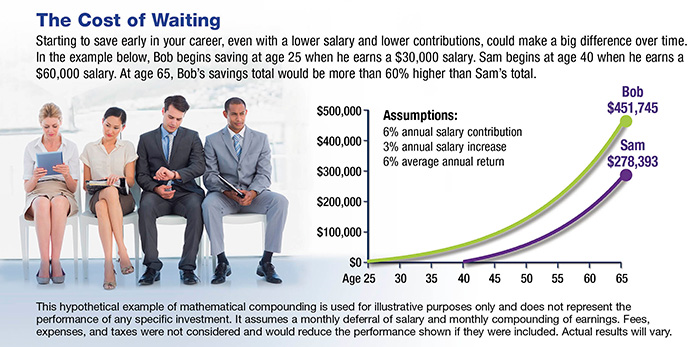One in five adults admits to being a chronic procrastinator. Among college students, the number may be as high as seven in 10, which might explain those all-nighters.1 In the “real world,” you can’t always cram for finals.
Procrastination can have far-reaching effects on important activities and decisions, such as completing tasks at work, obtaining medical treatment, and saving for retirement. A study of more than 22,000 people suggests that chronic procrastinators tend to have lower salaries and a higher likelihood of unemployment.2
Academic research provides some insights into procrastination that may be helpful if you or someone you know has a tendency to put off important tasks.
Repairing Your Mood
Procrastinators often feel anxiety about a task, so they try to make themselves feel better through “mood repair” — by doing something more enjoyable, such as surfing the Web, walking the dog, or making another pot of coffee.3 If this sounds familiar, you may be able to modify your behavior by doing some of the following.
Imagine your future self. One study found that people who viewed a digital image of themselves as they might appear in old age would contribute more to their retirement accounts than those who viewed a current image.4 On a more immediate level, try to imagine how good you might feel when you complete a project compared with the less pleasant feelings you might have if you don’t.
Take the plunge. Although a big project may seem daunting, getting a start — any start — could reduce the anxiety. Depending on the project, this might be a small first step or jumping in and preparing an outline, rough draft, or initial research, knowing you can polish and improve it later.
Forgive yourself. If you’ve postponed a task, don’t waste time feeling guilty. In most cases, “better late than never” really does apply.
Living in the Present
Procrastinators tend to be “present biased” rather than “time consistent” in their decision making, which means they tend to over-value immediate rewards and delay tasks whose rewards may be in the future. They might intend to take action tomorrow, but when tomorrow comes they postpone the task again, because tomorrow is now the present and they don’t want to act in the present.5
This tendency also affects the response to reminders, such as an email that a bill is due or a note that pops up on your calendar. If a reminder is regular and expected, a procrastinator may treat it as another present event to be pushed into the future. On the other hand, unexpected reminders tend to be more effective.6 It may be difficult to set up random reminders for yourself, but most calendar programs allow you to set up two separate reminders, and the second one might catch your attention. For some bills, you might set up automatic payments.
1–3) The Wall Street Journal, January 7, 2014
4) usnews.com, January 14, 2013
5–6) National Bureau of Economic Research, 2014
The information in this article is not intended as tax or legal advice, and it may not be relied on for the purpose of avoiding any federal tax penalties. You are encouraged to seek tax or legal advice from an independent professional advisor. The content is derived from sources believed to be accurate. Neither the information presented nor any opinion expressed constitutes a solicitation for the purchase or sale of any security. This material was written and prepared by Emerald Publications.
Click here for more Newsletters. Thank you.
Connect and Read More About Us
Hedges Wealth Management LLC - A Registered Investment Adviser
Hedges Insurance Agency LLC
Tax, Financial Planning, Investments & Insurance Advisors
1300 Appling Drive #201 | Mt Pleasant | SC 29464
T +1 843 270 2534
If you are looking for more information on any subject in this Blog, please
Contact Us directly electronically or via phone. Thank you.












